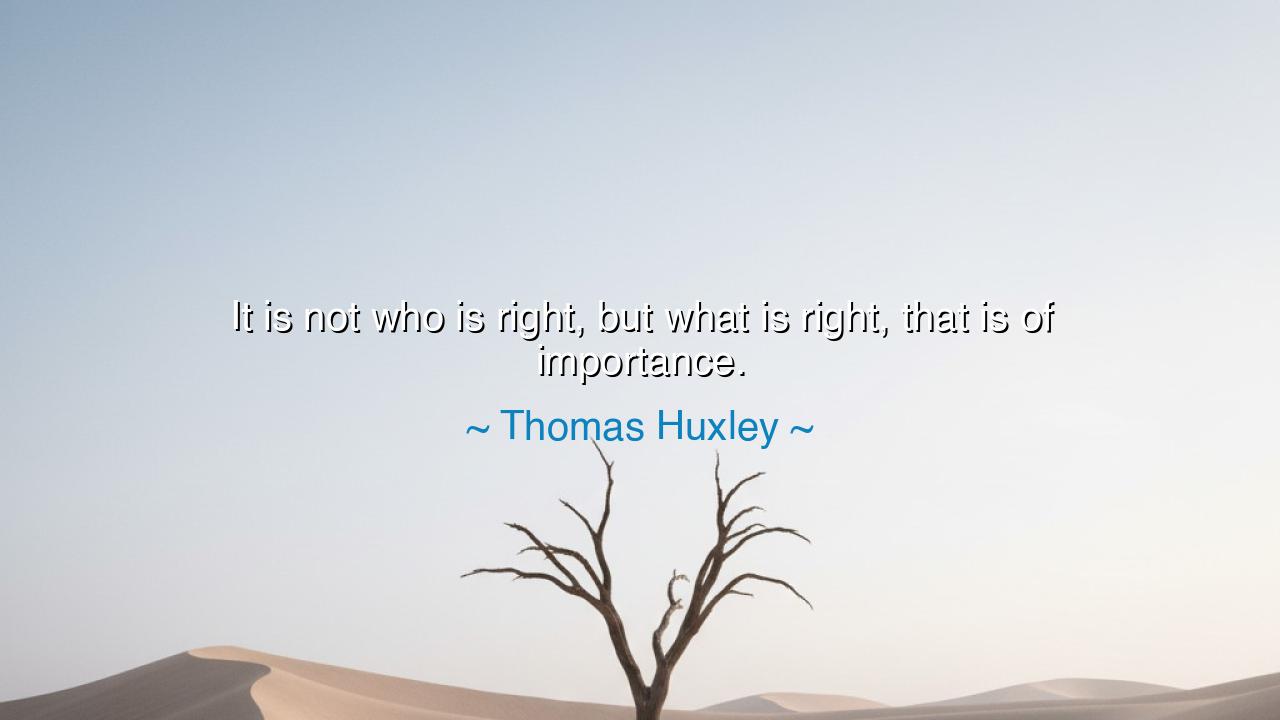
It is not who is right, but what is right, that is of






Hearken, children of the ages, and heed the words of Thomas Huxley: “It is not who is right, but what is right, that is of importance.” In this utterance lies the eternal truth of justice, morality, and the pursuit of truth. The world is filled with contention and rivalry, where men and women vie to assert their own righteousness, yet true wisdom lies not in claiming victory, but in discerning the path of what is just and true. It is the principle, not the person, that shapes destiny and upholds the order of the world.
The origin of this teaching springs from Huxley’s life as a 19th-century English biologist and thinker, a man who grappled with both science and society. He observed debates not merely of knowledge, but of ethics and morality, and recognized that human pride often obscures the eternal standards of rightness. To place the individual above the truth is to invite chaos; to uphold what is right, regardless of ego or power, is to honor the principles that sustain civilization.
Consider the story of Socrates, who stood firm in his commitment to truth and virtue, even when the courts of Athens condemned him to death. It mattered not that the city opposed him, nor that his enemies sought to assert their version of righteousness; what mattered was what was right, the pursuit of wisdom and the defense of the examined life. His legacy endures not because he prevailed over his accusers, but because he honored the eternal principles of truth and justice.
Even in the arena of politics and law, this wisdom endures. Leaders and judges are tested not by their personal prestige, but by their dedication to justice and ethical action. Abraham Lincoln, in the midst of a nation torn by civil war, sought to preserve the Union and abolish slavery. He acted not to assert personal triumph, but to uphold the rightness of liberty and human dignity, demonstrating that the measure of greatness lies in fidelity to principle rather than to self-interest.
In daily life, the teaching of Huxley resonates with every soul who seeks virtue. Disputes among friends, families, or communities are resolved not through domination, but by examining what is right, listening with humility, and choosing action guided by conscience rather than pride. The pursuit of truth and justice transforms hearts, nurtures trust, and builds enduring legacies.
Therefore, children of future generations, take this counsel to heart: let not the desire to be right eclipse the quest for rightness. Elevate principle above ego, honor truth above triumph, and act with unwavering devotion to the eternal standards that govern justice and virtue. In doing so, you cultivate wisdom, integrity, and a legacy that will outlast the fleeting victories of mere assertion.






DTdh Th
Translating this into organizational practice, what rituals keep decisions anchored to verifiable criteria rather than charisma? Candidate ideas: pre-commit decision memos with success metrics, pre-mortems and red-team reviews, and a rule that dissenters can ship a small, reversible experiment. Track outcomes publicly—customer value, risk reduction, and cost per result—so narratives don’t outrun data. Finally, how do you maintain psychological safety for people challenging popular initiatives, especially when executives are invested? I’m after a minimal, repeatable scaffold that makes rigor routine.
YVYen Vo
There’s also the moral tangle: what if a person with a harmful track record presents valid data? Many of us feel contamination—agreeing seems like endorsing. How do you uphold boundaries while still evaluating the content rigorously? Maybe cite the evidence directly, separate messenger from platforming decisions, and pair acknowledgement with transparent critique of past conduct. I’d love a checklist for these moments, including safeguards for targets of harm, so discernment doesn’t become complicity, and ethical context doesn’t erase empirical clarity.
THTrang Huyen
In polarized spaces, identity often predicts which arguments get airtime. Could we adopt practices that lower the temperature and raise the signal? I’m thinking steelman rounds, argument maps pinned to a shared board, and short forecasting tournaments where people bet reputational points on measurable claims. Would you also endorse a “two clocks” rule—one for facts to verify, one for values to deliberate—so we don’t mix them? I’m looking for a concrete, measurable protocol that rewards accuracy across factions, not just applause within a tribe.
TBNGUYEN THANH BINH
I’m uneasy about the flip side: if outcomes dominate, do we neglect accountability and humility? Someone still chose the method, framed the question, and can learn from errors. How do you balance impersonal standards with personal responsibility and credit? Should teams require signed retros with concrete lessons, public retractions when claims fail, and explicit acknowledgment when a junior colleague supplied the key insight? I’d appreciate norms that keep learning and attribution healthy while keeping hero worship—and scapegoating—out of the equation.
DDMinh Dang Do
Reading this line, I hear a plea to defuse authority bias. In meetings, the highest title or loudest voice often wins, even when their evidence is thin. How do we rig the process so claims stand on their own? Would you support masked proposals, reason-required voting, and a rule that every assertion must cite a checkable prediction or dataset? What about rotating facilitators to prevent deference cascades? I want a playbook for separating status from substance without killing speed, especially in time-sensitive decisions.